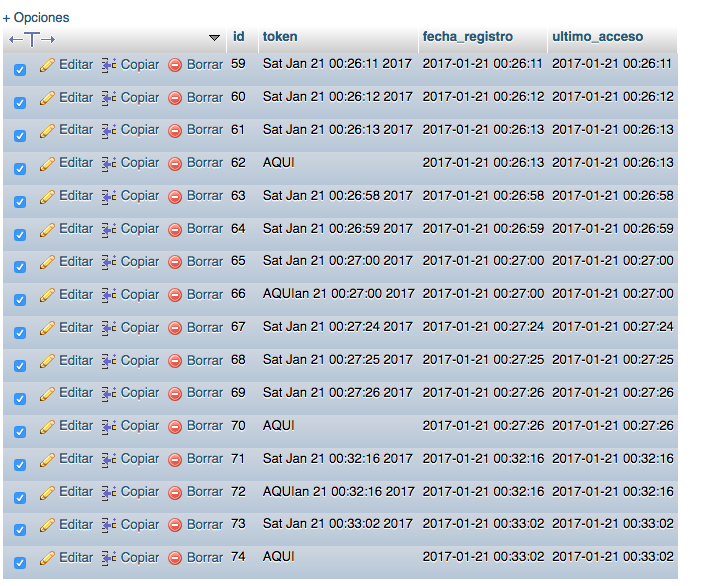Veréis tengo el siguiente código escrito en C que usa la API de MySQL para conectarme a una BD. A la hora de insertar me interesa hacerlo con las Prepared Statement de la API y a la hora de insertar texto me sucede lo siguiente:

Como veréis en el código más delante lo que intento hacer es insertar la palabra "AQUI" al salir del bucle despúes del commit aprovechando el código que ya tengo. El ejemplo es estupido pero he cambiado el texto por provar y de repente: NO FUNCIONA! y no consigo entender porque . El código es:
void insertar_usuario(MYSQL *conn, MYSQL_STMT *stmt){
char *stmt_str = "INSERT INTO users (id, token, fecha_registro, ultimo_acceso) VALUES(?,?,?,?)";
MYSQL_BIND param[4];
int *id; /* SERA NULL PORQUE A.I. */
char token[26]; /* token aleatorio de 25 caracteres */
unsigned long token_length; /* */
MYSQL_TIME fecha_creacion; /* */
MYSQL_TIME ultimo_acceso; /* */
time_t hora;
struct tm *cur_time;
printf ("Empezamos a insertar datos\n");
if (mysql_stmt_prepare (stmt, stmt_str, strlen (stmt_str)) != 0) {
print_stmt_error (stmt, "Could not prepare INSERT statement");
return;
}
memset ((void *) param, 0, sizeof (param)); /* zero the structures */
param[0].buffer_type = MYSQL_TYPE_LONG;
param[0].buffer = (void *) &id;
param[0].is_unsigned = 0;
param[0].is_null = 0;
param[1].buffer_type = MYSQL_TYPE_STRING;
param[1].buffer = (void *) token;
param[1].buffer_length = sizeof (token);
param[1].is_null = 0;
param[2].buffer_type = MYSQL_TYPE_DATETIME;
param[2].buffer = (void *) &fecha_creacion;
param[2].is_null = 0;
param[3].buffer_type = MYSQL_TYPE_DATETIME;
param[3].buffer = (void *) &ultimo_acceso;
param[3].is_null = 0;
if (mysql_stmt_bind_param (stmt, param) != 0) {
print_stmt_error (stmt, "Could not bind parameters for INSERT");
return;
}
mysql_autocommit(conn, 0);
for(int i = 0 ; i < 1 ; i++){
(void) time (&hora); /* get current time */
/* Damos valores */
id = NULL;
strcpy(token, ctime(&hora));
token[24] = '\0';
token_length = strlen(token);
param[1].length = &token_length;
cur_time = localtime(&hora);
fecha_creacion.year = cur_time->tm_year + 1900;
fecha_creacion.month = cur_time->tm_mon + 1;
fecha_creacion.day = cur_time->tm_mday;
fecha_creacion.hour = cur_time->tm_hour;
fecha_creacion.minute = cur_time->tm_min;
fecha_creacion.second = cur_time->tm_sec;
fecha_creacion.second_part = 0;
fecha_creacion.neg = 0;
ultimo_acceso.year = cur_time->tm_year + 1900;
ultimo_acceso.month = cur_time->tm_mon + 1;
ultimo_acceso.day = cur_time->tm_mday;
ultimo_acceso.hour = cur_time->tm_hour;
ultimo_acceso.minute = cur_time->tm_min;
ultimo_acceso.second = cur_time->tm_sec;
ultimo_acceso.second_part = 0;
ultimo_acceso.neg = 0;
if (mysql_stmt_execute (stmt) != 0) {
print_stmt_error (stmt, "No se ha podido ejecutar la sentencia SQL");
mysql_rollback(conn);
return;
}
printf("%s\n", "Datos insertados correctamente!!");
mysql_commit(conn);
sleep(1);
/* POSIBLE SOLUCION PEGANDO AQUI */
}
mysql_autocommit(conn, 1);
/* POSIBLE SOLUCION PEGANDO AQUI */
/* Damos valores */
id = NULL;
strcpy(token, "AQUI");
token[4] = '\0';
token_length = strlen(token);
fprintf(stdout, "strlen(\"%s\") = %lu\n", token, strlen(token));
param[1].length = &token_length;
cur_time = localtime(&hora);
fecha_creacion.year = cur_time->tm_year + 1900;
fecha_creacion.month = cur_time->tm_mon + 1;
fecha_creacion.day = cur_time->tm_mday;
fecha_creacion.hour = cur_time->tm_hour;
fecha_creacion.minute = cur_time->tm_min;
fecha_creacion.second = cur_time->tm_sec;
fecha_creacion.second_part = 0;
fecha_creacion.neg = 0;
ultimo_acceso.year = cur_time->tm_year + 1900;
ultimo_acceso.month = cur_time->tm_mon + 1;
ultimo_acceso.day = cur_time->tm_mday;
ultimo_acceso.hour = cur_time->tm_hour;
ultimo_acceso.minute = cur_time->tm_min;
ultimo_acceso.second = cur_time->tm_sec;
ultimo_acceso.second_part = 0;
ultimo_acceso.neg = 0;
if (mysql_stmt_execute (stmt) != 0) {
print_stmt_error (stmt, "No se ha podido ejecutar la sentencia SQL");
return;
}
printf("%s\n", "Datos insertados correctamente!!");
}
Gracias a todos de antemano!
ACTUALIZADO
Me he dado cuenta que el problema esta en la longitud del texto que estamos enviando y es posible que tenga que volver a hacer:
mysql_stmt_prepare()
mysql_stmt_bind_param()
Pero entonces, eso significaría que hay que saber la longitud del texto que vamos a enviar antes de ejecutar mysql_stmt_bind_param() y que param[1].length = &token_length; no sirve de nada, pues al salir del bucle lo tengo de nuevo y nada (cuando el fprintf da el valor esperado 4)
POSIBLE SOLUCIÓN - ¿POR QUÉ?
He actualizado el código, si copio y pego este fragmento de código:
if (mysql_stmt_bind_param (stmt, param) != 0) {
print_stmt_error (stmt, "Could not bind parameters for INSERT");
return;
}
En las partes del código que pone /*Posible solucion pegando aquí */ (solo en 1 de las 3, las ponga en cualquiera funciona) Obtengo:
Hay varías entradas de las diversas pruebas, fijarse en las que pone claramente AQUI
